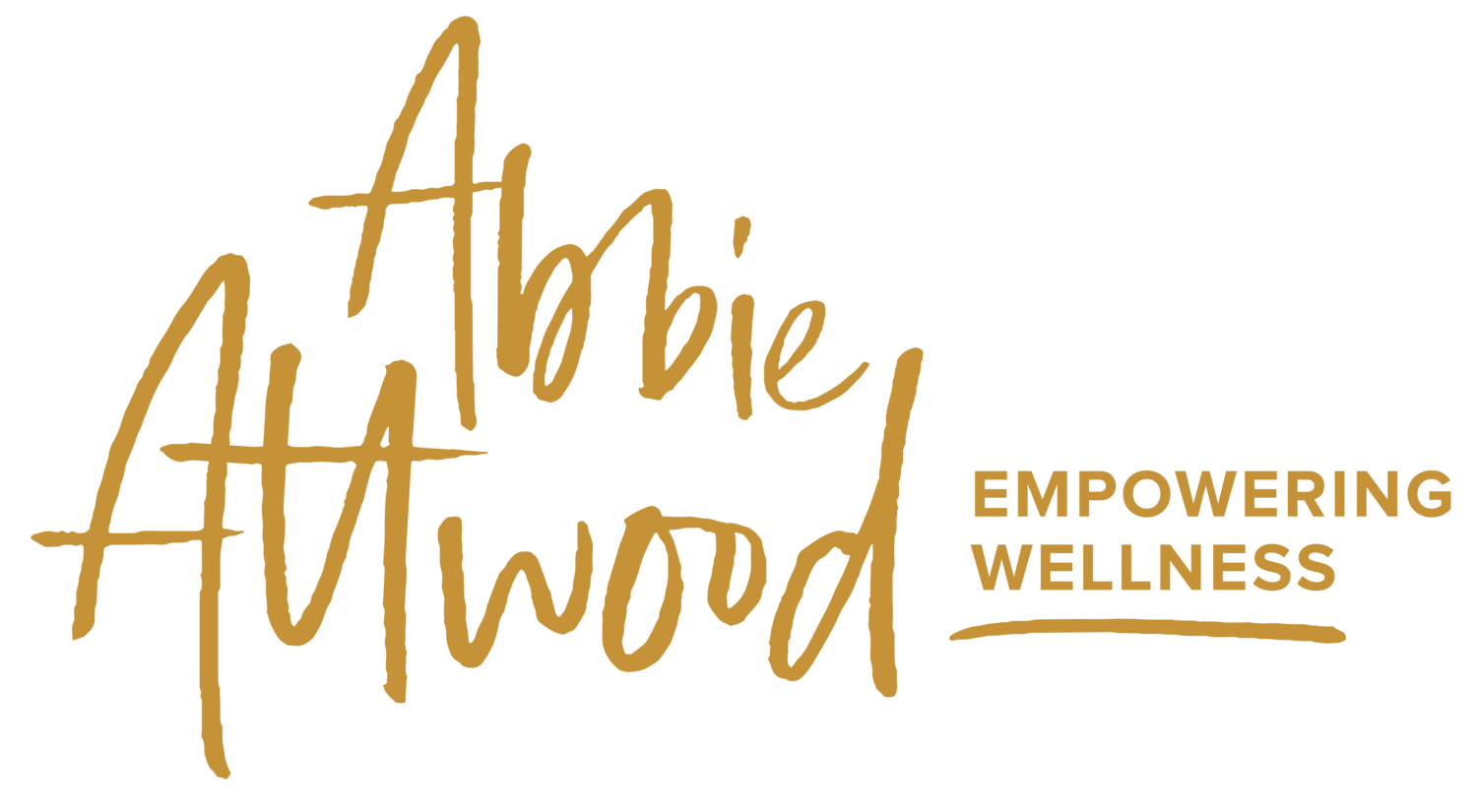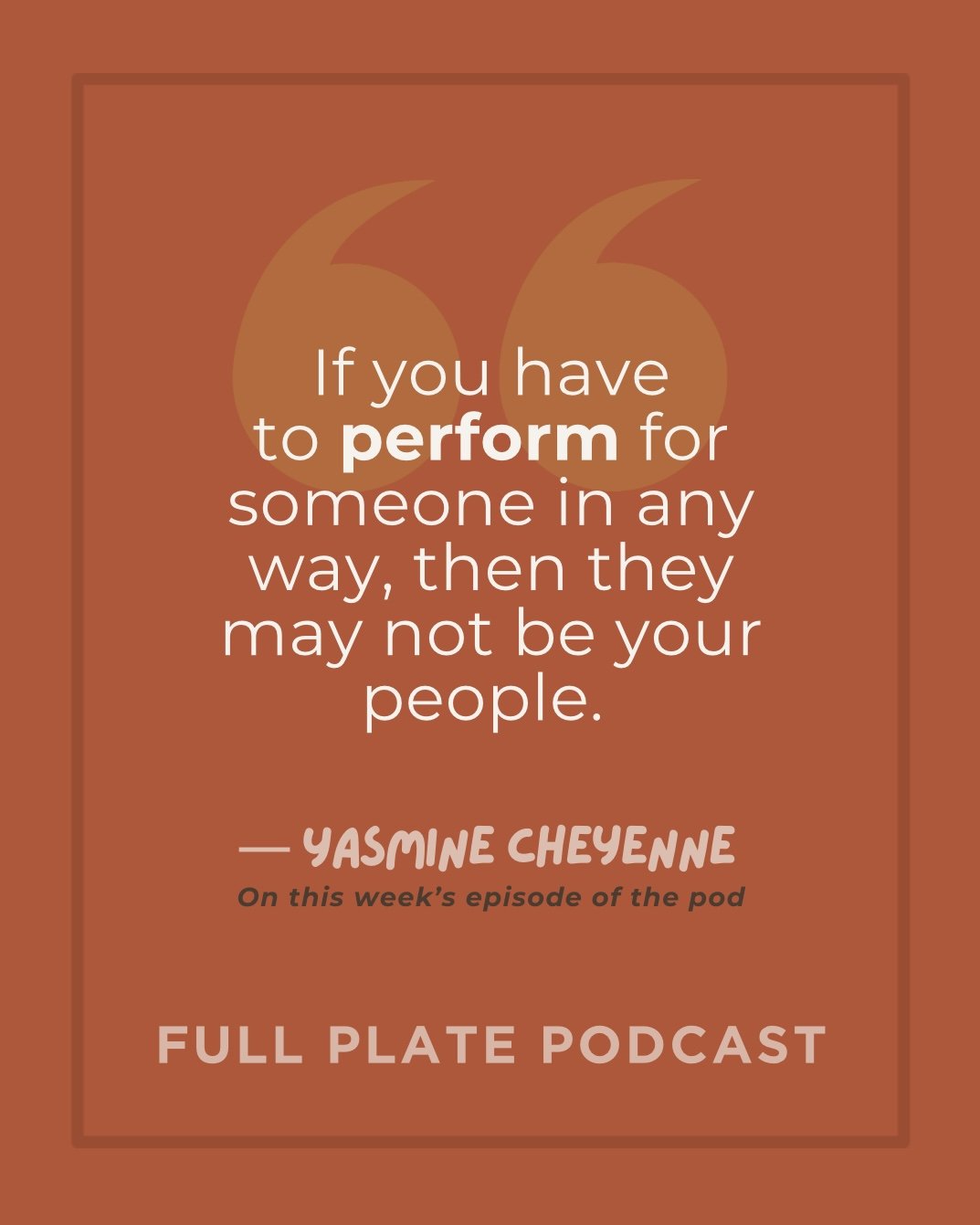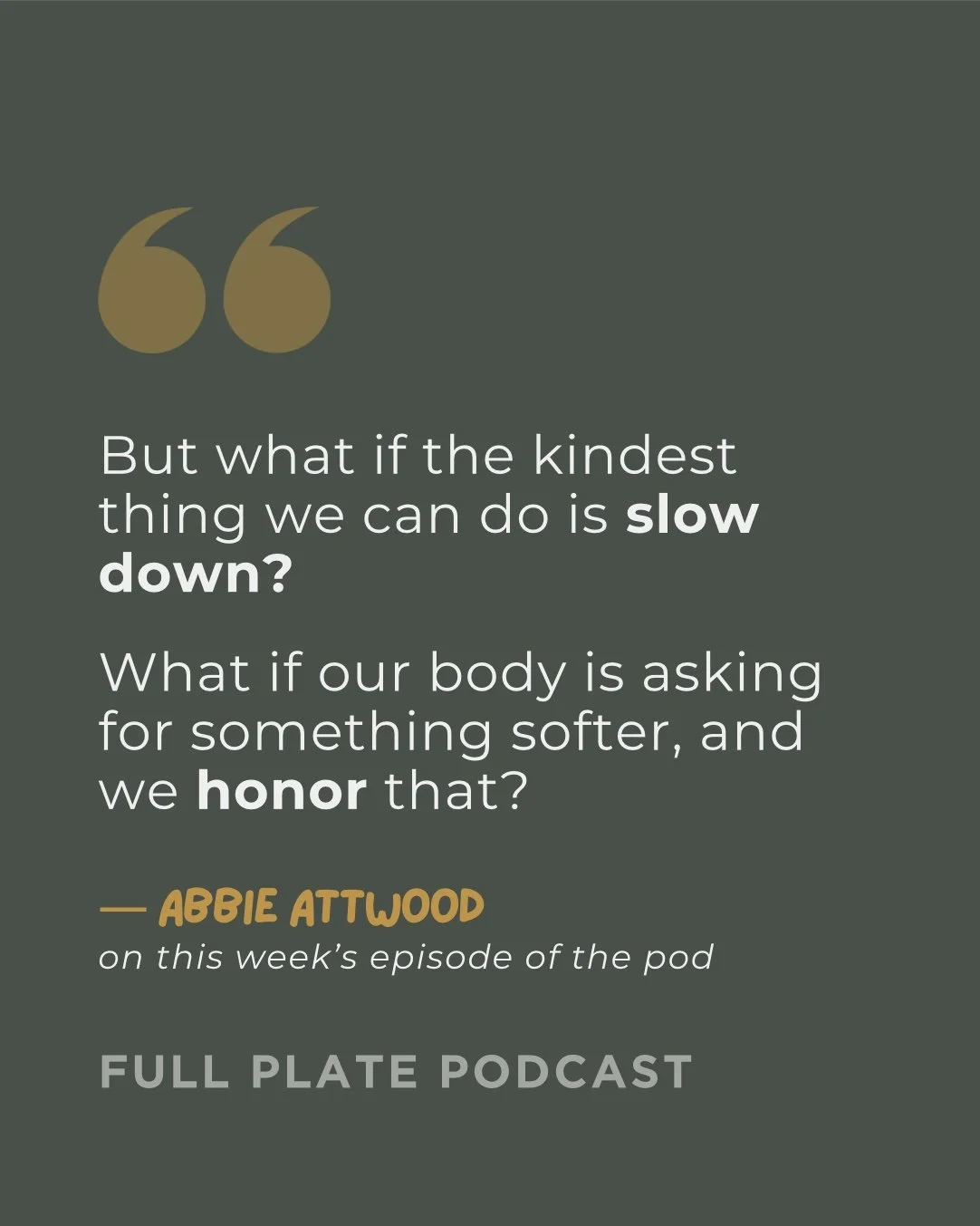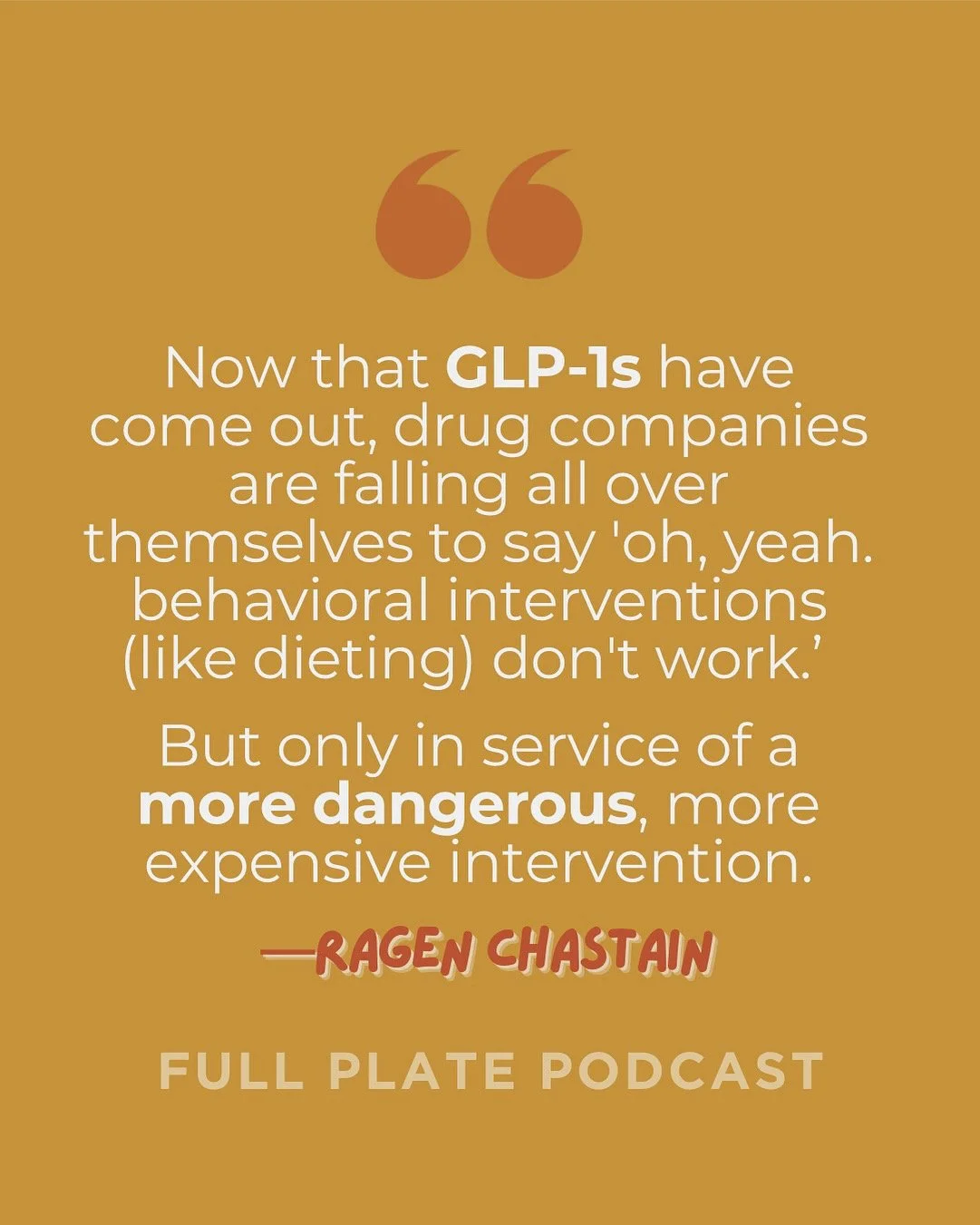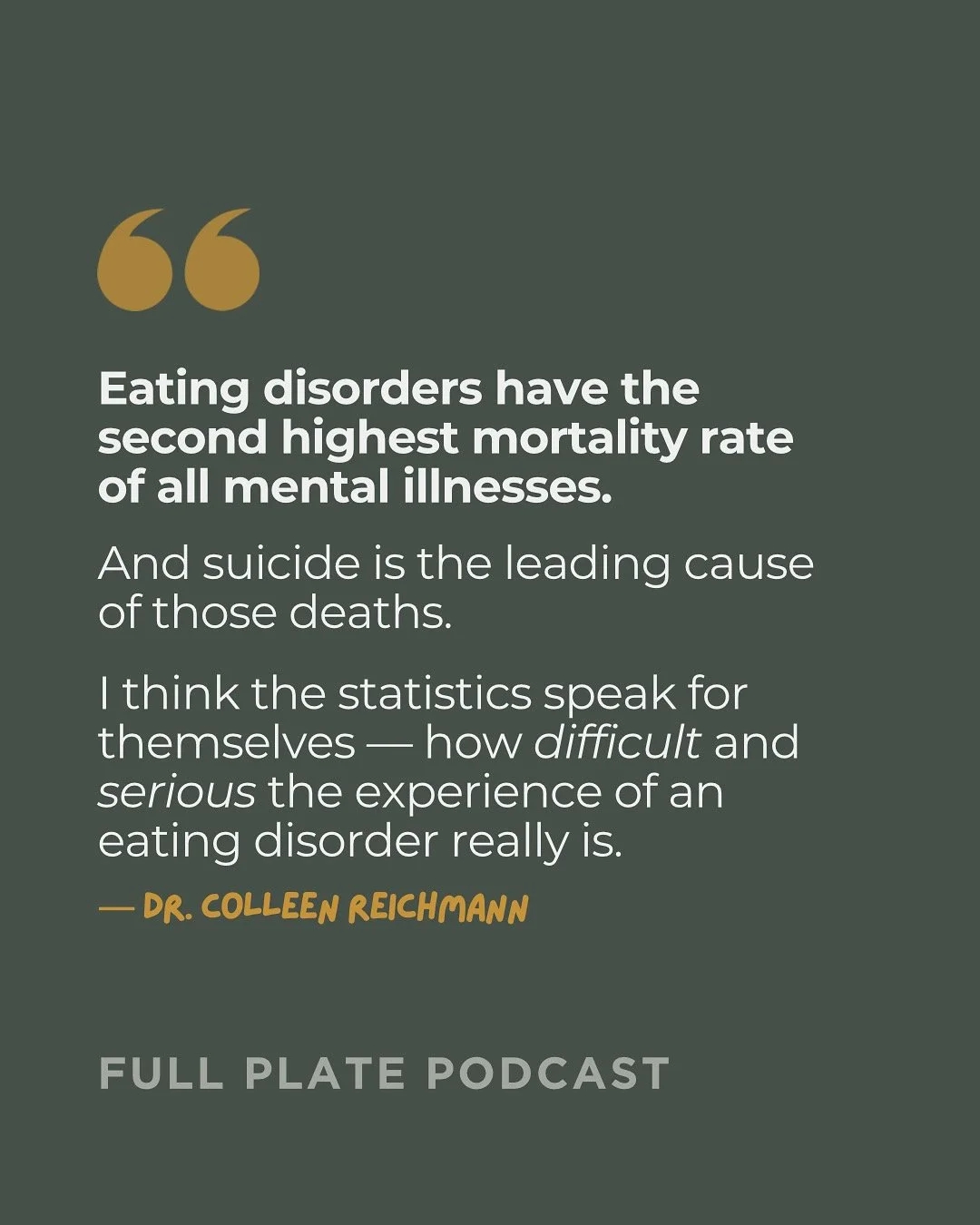
Listen to the Full Plate podcast!
Each episode is created with you in mind.

Ditch diet culture, respect your body, and set boundaries.
#199: The Cost of Self-Abandonment and How to Finally Choose Yourself with Yasmine Cheyenne (best of)
Because it's the end of the year, I figured we needed this one: Yasmine Cheyenne helps us walk some of our most challenging paths: self-forgiveness, people-pleasing, unhealthy relationships, and comparison.
#198: Holiday Q&A: Food Comparison, Friends on Diets, Body Image, Boundary Struggles, and Befriending Rest
Abbie answers this month’s community Q&A questions.
#197: Is Perimenopause a Diet Now? Talking Soft Pants and Midlife Wellness Traps with Cole Kazdin
In this episode, Cole Kazdin returns (her second time on the pod!) to talk to Abbie about perimenopause and all the misinformation out there about it.
#196: Is Psychedelic Therapy a Future Treatment for Anorexia? Exploring the Research with Dr. Marissa Raymond-Flesch
Dr. Marissa Raymond-Flesch talks with Abbie about leading a groundbreaking clinical trial at UCSF exploring psilocybin-assisted therapy for young adults with anorexia — a first-of-its-kind study looking at whether psychedelics might help loosen some of that rigidity, support new ways of relating to food and the body, and offer hope where other approaches haven’t.
#195: Forget “Aging Gracefully”: How to Live Fully in a Changing Body with Deb Benfield, RDN
Deb Benfield, RDN, returns to talk about what it really means to age unapologetically.
#194: Chronic Illness and the Weight-Food-Body Connection
In this episode, Abbie answers a listener question about why chronic illness and disordered eating overlap so often.
#193: Why Processed Food Isn’t the Problem and Other Wellness Culture Myths with Shana Spence, RD (best of)
Shana Spence, a registered dietitian (who you might know as @thenutritiontea on social media), joins the pod to bust myths about processed foods and to discuss how family, culture, privilege, and societal influences shape our relationship with food.
#192: Binge Eating, Perfectionism, and the Myth of Willpower with Dr. Regina Lazarovich
On this new episode of the Full Plate Podcast, Abbie is joined by Dr. Regina Lazarovich, a clinical psychologist, Health at Every Size (HAES)–aligned provider, and someone with lived experience of binge eating and perfectionism.
#191: Parenting Through the Perimenopause / Puberty Overlap + Creating a Diet-Culture-Free Home with Oona Hanson
Oona Hanson, educator and parent coach who supports families navigating diet culture and eating disorders, joins the pod to talk about midlife body challenges as well as the pressures teens are facing around food and weight.
#190: Behind the Buzz of GLP-1s: Side Effects, Long-Term Risks, and Weight Loss at All Costs with Ragen Chastain (Best of)
Ragen Chastain is back to continue our conversation about weight, health, and diet culture — this time answering listener questions about the GLP-1s you’ve been hearing so much about: Wegovy, Ozempic, and other weight-loss drugs.
#189: "But Isn't Being Fat Bad for Your Health?"...Unpacking Weight Science with Ragen Chastain (Best of)
In this episode, I’m joined by the incredible Ragen Chastain — researcher, writer, speaker, and thought leader in weight science and weight stigma.
#188: The Concept of "Full Recovery" + Living in the Middle Place with Mallary Tenore Tarpley, Author of "SLIP"
Mallary Tenore Tarpley joins the pod to talk about the middle place between being acutely ill or completely healed from your eating disorder.
#187: Relapse in Eating Disorders, Substance Use, and Treatment Trauma with Sandi James, Psychologist
Sandi James — a registered psychologist and Certified Eating Disorder Recovery Coach — joins Abbie to talk about her lived experience with both eating disorders and substance abuse, and how her own healing has profoundly shaped her work.
#186: Fitness as Liberation: Joy, Community, and Care with Ilya Parker (Part Two)
MAHA, diet culture, and toxic fitness ideals...this is the second half of my conversation with Ilya Parker.
#185: Decolonizing Fitness with Ilya Parker: Gender, Weight Stigma, and the Toxic Fitness Industry
Ilya Parker, founder of Decolonizing Fitness, joins Abbie to share how gender transition, weight stigma, and ableism shaped their path into fitness and ultimately inspired a new vision for movement.
#184: The PCOS 'Fix' Isn’t Weight Loss or Another Diet with Julie Duffy Dillon, RD
Julie Duffy Dillon, RD joins Abbie to talk about PCOS (Policystic Ovary Syndrome), how it intersects with diet culture, and why dieting and weight loss are not actually evidence based approaches to managing this health condition.
#183: "What If I'm Just Uncomfortable Being Fat?" with Edie Stark, and Sharon Maxwell
This might be my favorite conversation we’ve had on this podcast. It's a conversation I had with Edie Stark (an ED therapist) and Sharon Maxwell (a fat activist and weight-inclusive consultant), and we’re answering a very important – very hard – listener question.
#182: Perimenopause, "Belly Fat," and Carb-Phobia: How Wellness Culture Targets Women in Midlife with Debra Benfield, RDN
In this listener-favorite episode, Debra Benfield, RDN joins the pod to speak with me about the intersection of diet culture, anti-fatness, and anti-aging.
#181: The Part of Recovery No One Talks About: Hopelessness and Suicidal Ideation in Eating Disorders With Dr. Colleen Reichmann
Dr. Colleen Reichmann—a clinical psychologist, author, and eating disorder specialist—joins me this week to talk about hopelessness and despair in eating disorder recovery.
#180: Does Intermittent Fasting Help in Midlife? A Closer Look at the Research
Lately, intermittent fasting has been getting more attention as a possible approach for women in midlife. And as with most health trends, this has sparked a lot of questions — and just as many opinions.

